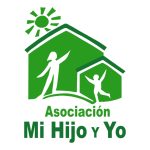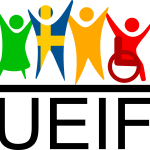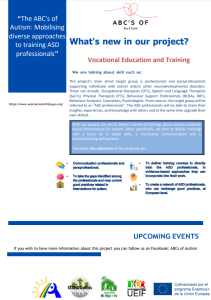The ABC's of Autism
Mobilising diverse approaches to training ASD professionals
2021-2-CY01-KA210-VET-000048730

About
Autism spectrum disorder(ASD) is a complex neuro-developmental disorder that typically appears in the first three years of life; it is the result of a neurological disorder that affects the normal functioning of the brain, affecting development in the areas of social interaction and communication (Dunn & Leitschuh, 2006).
People with autism have difficulty with social interactions, communicating, and using sensory information. An increasing need for education and support to that population is evident for making physical, social and attitudinal environments more accessible, inclusive and supportive for them and for developing their social and life skills in order to be integrated into society and live independently. There are numerous therapies dedicated to improve communication, cognitive and motor skills of children with autism. Not all of them though are proven to be as effective or evidence-based.
Apart from that, every child or adult with autism has unique strengths and challenges, so there is no one size fits all approach to autism treatment and intervention. Each autism intervention or treatment plan should be tailored to address the person’s specific needs. (autismspeaks.org). It is, therefore, of paramount importance, for ASD professionals (i.e Occupational therapists (OTs), Speech and Language Therapists (SaLTs), Physical Therapists (PTs), Behaviour Support Professionals (BCBAs, RBTs, Behaviour Analysts), Counsellors, Psychologists etc.) to be trained in various treatments and interventions. With our project, we aim to deliver a series of trainings about various evidence-based interventions for autism.
More specifically, we plan to deliver 4 different trainings with a focus on
1. Social skills
2. Functional Communication
3. Communicating with parents
Therefore, having as target group youth workers and marginalized youth/ youth at-risk of exclusion, we propose a project with the following objectives:
To take the gaps identified among the professionals and map current good practices related to interventions for autism.
- To deliver training courses to directly train the ASD professionals, in evidence-based approaches they can incorporate into their work.
- To create a network of ASD professionals, who can exchange good practices, at European level
As a result, we expect:
- an increase in autism awareness among the professionals, partner organisations and their local community
- to guide best practice in supporting individuals with autism
- professionals to make positive changes in their practice as a result of the program.
- the professional development of the ASD professionals to contribute to creating inclusive environments, promote social inclusion and improve the outreach of people with ASD
- the development of a continuing vocational training program for ASD professionals
- the project to contribute to closing existing gaps in the access to training for professionals working with autism
- the project to contribute to enhancing the communication and collaboration between professionals working with individuals with autism and their families
ASD professionals (i.e Occupational therapists (OTs)
Speech and Language Therapists (SaLTs)
Physical Therapists (PTs)
Behaviour Support Professionals (BCBAs, RBTs, Behaviour Analysts)
Counsellors (Psychologists etc.)
Training Activities
The teaching interaction procedure is an evidence-based procedure that has been utilized for the development of social skills. At this training activity, participants will learn the main steps of the procedure and the basic theory behind the method. During the 2-day training event they will have the opportunity to practice using it, through role-play scenarios
At this training, experts will have the opportunity to learn the theoretical foundations of parenting and the difficulties that imply parenting a child with an autism spectrum disorder. What are the biggest challenges that parents face at different stages of a child’s life. One of the goals is to raise awareness of experts what is the importance of educating and empowering parents, for a better quality of life for a child with autism spectrum disorder, but also for his entire family. Experts will have the opportunity to learn how to assess the strengths and needs for family support and how to provide them with adequate support. One part of the lecture will also focus on siblings and how experts can work with them on empowerment. Also, this training will include workshops where experts will have an opportunity to practice to apply the learned knowledge. Active participation of all participants is necessary in order to acquire skills that can be applied in practice and daily work with families. The main objective of the training is that experts feel confident to empower and educate parents, to better understand the context of family functioning, to recognize parents’ needs for support and how they can provide that support and assistance from their roles.
The main focus of the training programme will be to provide tools to professionals who work with ASD people under a Family-centered intervention. Mi hijo y yo is going to provide a 3-day training with the following content:
-Basic Therapeutic Skills
– Intervention Programs with Families to improve the development of their children (The PACT model, The MyMind program)
– Family intervention approach under the Behavior Analysis for people
Training Guide

The Guide is a document that anyone can refer to and obtain knowledge, information and know-how in order to implement the strategies learnt during the 4 training activities. It is divided into 4 modules, one per training activity. It takes ASD professionals through a step-by-step process of:
1. implementing the Teaching Interaction Procedure (module 1 based on activity: Teaching Social Skills through the Teaching Interaction Procedure)
2. Communicating with families of children with ASD (module 2, based on activity How to talk, empower and educate parents of children with ASD)
3. implementing Intervention Programs with Families to improve the development of their children (The PACT model, The MyMind program) (module 3, based on activity Supporting families of children with autism)
4. Facilitating communication among neurotypical and neurodiverse individuals (module 4, based on activity ASD Communication Training)
Partners




